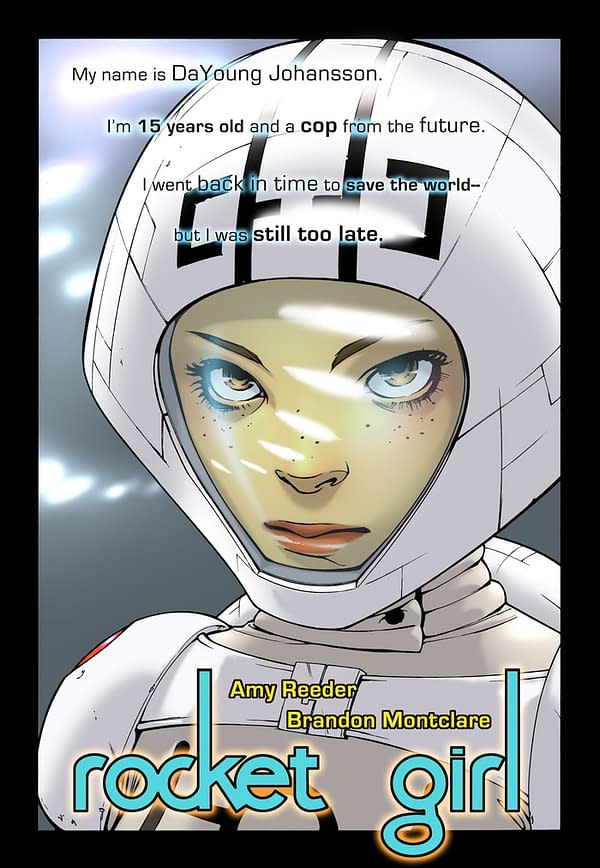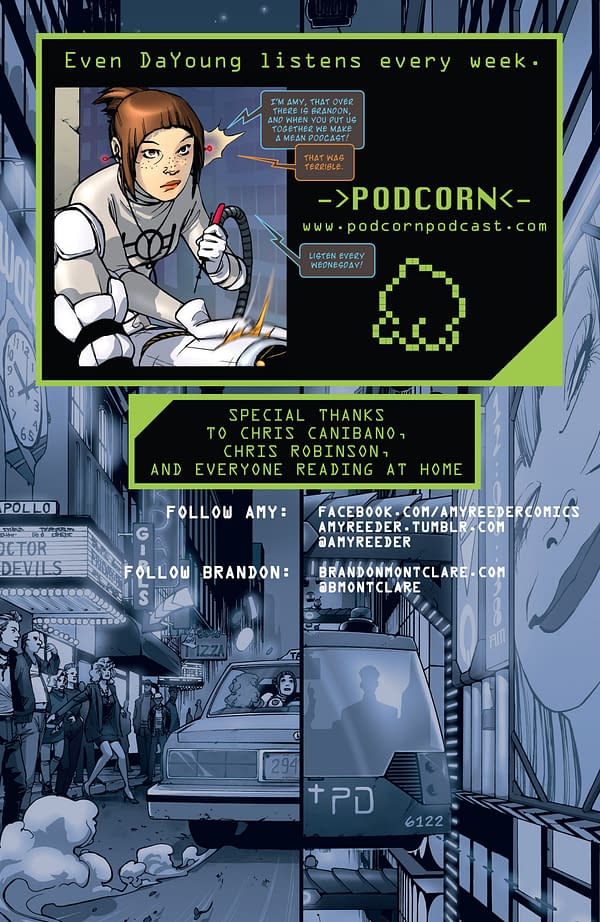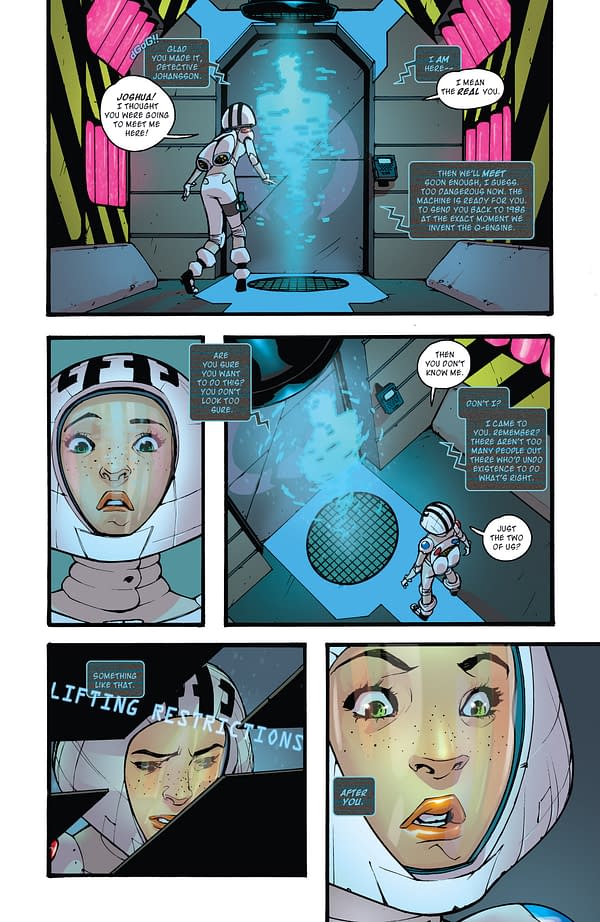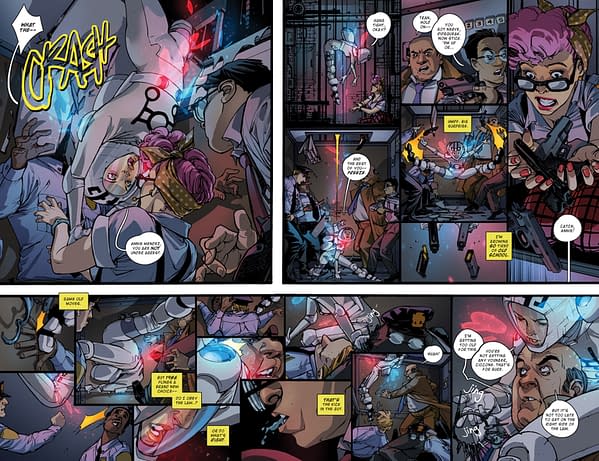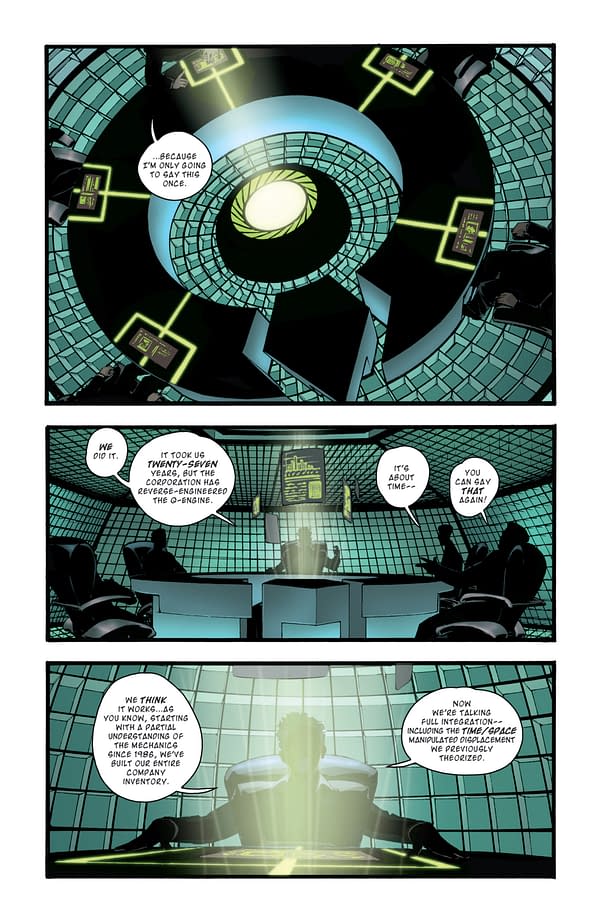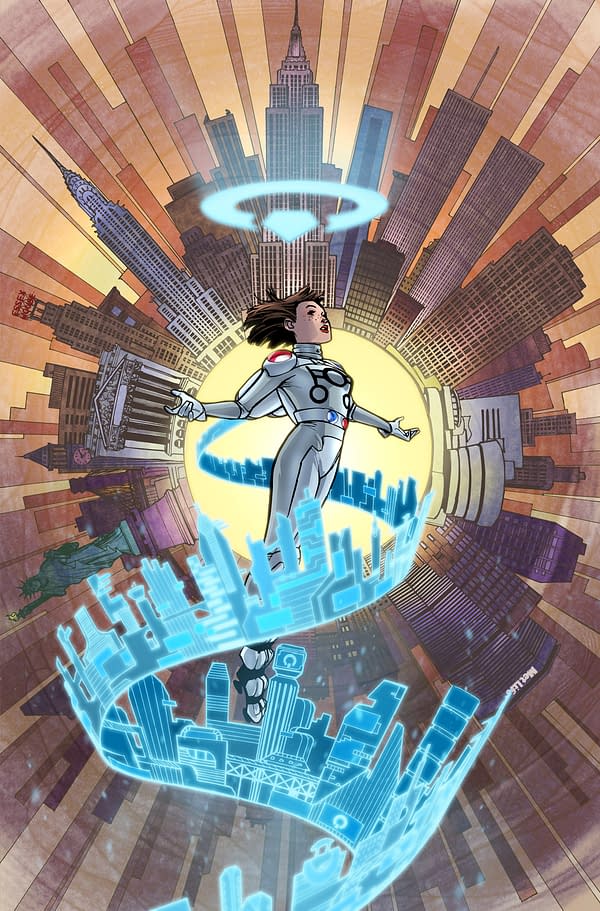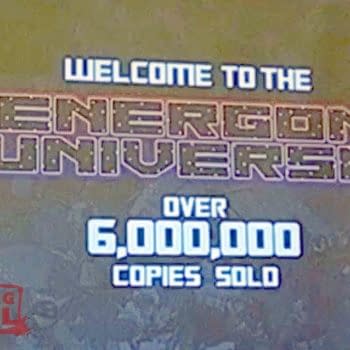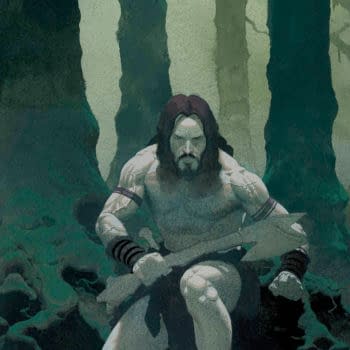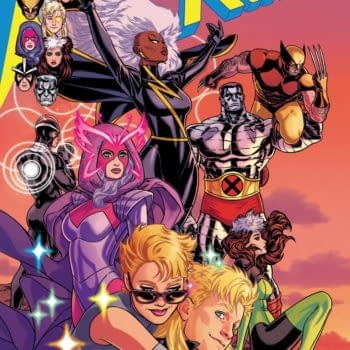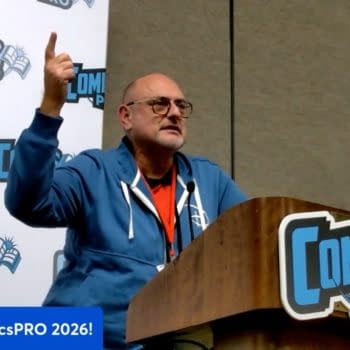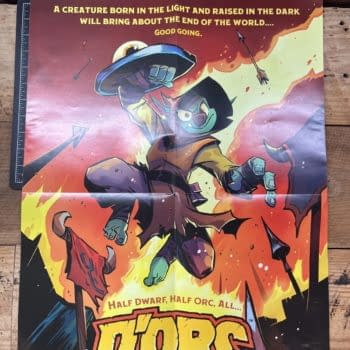Posted in: Comics | Tagged: amy reeder, Brandon Montclare, Comics, entertainment, image comics, kickstarter, Podcorn, rocket girl, Rocket Girl Vol. 1: Times Squared
A 15 Year Old With A Jetpack, New York Nostalgia, And Imagined Futures – Brandon Montclare And Amy Reeder Talk Rocket Girl Vol. 1
From a successful Kickstarter to a 5 issue series from Image Comics, now collected in its first volume this week, to the announcement of the series' return this autumn, Rocket Girl has displayed all the velocity you might expect from the title, and that's all down to the vision of the series creators Brandon Montclare (Fear Itself: Fearsome Four) and Amy Reeder (Batwoman, Madame Xanadu). Both have worked in the mainstream, but felt that Rocket Girl was one of those concepts that wouldn't come to fruition without taking it to fans as a creator-owned project, and their instincts were right in finding their own fanbase to explore their 1980s and multiple-futures world with total creative control.
DaYoung is a 15 year old cop from the future who journeys into the past in an attempt to save her own future world of 2014, only to find that things are far more temporally confusing than she might have expected. Add to that the perceptions she brings with her about the relationship between adults and young people, and she's an aerial wonder with plenty of baggage to sort through, but with Reeder's incessantly visually impressive renderings of New York past and future and her penchant for keeping objects "in motion" in dynamic layouts, Rocket Girl is one of the most memorable comics I've encountered in the last few years. Collecting the first five issues into the series' first trade only adds to the comic series' visual and thematic statements about youth and age, hope and acceptance. It's quite a ride where we finally get our jetpacks, at least vicariously.
Montclare and Reeder join us here at Bleeding Cool to talk about the genesis of the series, their goals in creating it, and what to look forward to when Rocket Girl returns this autumn.
Hannah Means-Shannon: To go back to the genesis of Rocket Girl as described in your Kickstarter, what's the basis of your choice to use New York in the 80's as a setting? What are the things about that period and geography that particularly attracted you?
Brandon Montclare: Even before Rocket Girl I'd been thinking about a period piece set in the 1980s. It interested me especially because I think it's the most recent time that's still "historic." I don't think the 90s have yet been processed enough that they feel distinct. Setting it in NYC is natural since I'm from here, and Amy now lives here. But more than that familiarity, the city was a very different place 30 years ago—the crime and filth and seediness have mostly disappeared. In a lot of ways, today's NYC is more similar to DaYoung's crazy hi-tech alternate future than the real 1986. And as the series developed there were a lot of unique story points that kept materializing. So it has proven more fruitful than just random times and places.
Amy Reeder: It's really a hot topic here in New York—everyone who lived here in the 80's talks about how crazy/dangerous/different it was, and many claim it was better back then, before Disney came to Times Square and the rent became "Too Damn High." And the opposition claims it's all talk…that people become nostalgic and romanticize those dangerous years but would never actually go back. It makes a great backdrop to our story, where the "future" looks perfect…but at the cost of freedom and realness.
HMS: Rocket Girl's heroine is not only a 15 year old but has huge responsibilities and stresses and a general distrust of adults. Why work with a young heroine like this? Why did you want to create a comic where age plays such a big role in the plot?
BM: Working with Amy, it was a safe bet we'll do something with a female lead. I'm of the belief that it's the writer's job is to set up the artist so he or she can deliver the important stuff. I don't say that from a place of collaborative generosity, rather it's a necessity of making good comics. Amy's likewise great at the nuances of teenagers. So it was really just playing to her strengths. All that being said: writing DaYoung is a lot of fun. And the themes of growing up from youth to adult—which in Rocket Girl is pretty much youth vs. adults—are what this story is about more than anything else.
AR: I'll add that from knowing Brandon, I know he has always had an interest in youth and what it means to be young. Like he will never get annoyed by anything a person does—so long as that person is younger than mid-twenties—and I think more than most people, he feels strongly about young people being innocent and free from blame. So for him, there really is a clear difference between old and young…and that assumption plays a huge role in the story.
HMS: Do the future elements of Rocket Girl reflect any of your own fears about our own possible futures? How did you decide on discussing certain dangers that may await us and possible ways to build a better future?
BM: If someone hasn't read it yet, it's not a spoiler to say that the "future" is an alternate reality version of 2014. The inspiration was 1980s sci-fi like Akira or Blade Runner or Back to the Future II or Days of Future Past from X-Men that envisioned a very different 2014. It's the 'where's-my-jetpack' meme. In DaYoung's world, they're living the hi-tech utopia. NYC is fairer and cleaner and safer. So even if Quintum Mechanics played around with time travel, is it wrong if the world is a better place? Our point was to make DaYoung's 2014 feel more like the real world, despite all the technology. It's a cleaned up Big Apple. There's a nostalgia for old NYC—the crime and pollution and sleaze. A world that was far less corporate, if more unstable. If you're a person that misses all those things, you're right now living in that frightful future!
AR: This is a subject I really could spend an entire interview on…I'm obsessed with predictions of the future and what they got right, and what they got wrong as they misunderstood the natural path of human nature. Take this flying car business—we thought we would be using technology to do all these amazing-yet-dangerous physical feats, creating a stale, robotic environment. But at our core we are such social creatures. No one seemed to have expected us to use technology primarily for social and informational purposes, but that's exactly what we've done.
I admit, I have been feeling a little more pessimistic about our future, as our technology solidifies power and creates a pretty covert mess that we're meant to be too distracted from to notice. But if there's one thing I can glean from past predictions of the future, it's that eras do end, especially the ones that trouble us.
HMS: Can you tell us a little about the psychology of DaYoung and how you think she develops through the first 5 issues of the comic? What features of her personality do you find most interesting or universal?
AR: She's a bit self-contradictory, which I think is what makes her most human and relatable. On one hand, she distrusts adults and basically never wants to become one; and on the other, she seems to insist that she is mature enough to handle danger and make some pretty huge decisions. I think we all know kids who seem alarmingly mature and yet as you get to know them, you realize no one can escape one's age. DaYoung is no different.
BM: DaYoung starts out seeing the world in black and white. Rigidity is what defines her, and by extension all of the teenage police officers. She doesn't trust jaded adults—and of course she feels she'll never be that way herself, when she grows up. But for the first time in her life, the events in Rocket Girl show her that there are shades of grey. Right or wrong isn't so simple. I think that's both interesting and universal. As we mature we understand that reality is complicated—but that realization weakens all of our beliefs, I think. You can look at DaYoung as naïve or even foolish—but she believes harder than anyone else. This discovery is fluid in Rocket Girl. As much as DaYoung's forced to accept the nuances of a situation, she likewise inspires others to have the courage of their convictions. It's a balance that Amy and I will try to keep—because I don't think there's an easy answer.
HMS: I was delighted to see that issue #5 of Rocket Girl teases a return in #6 this autumn. Please give us some teasers about where the story might be headed or any "big ideas" you hope to pursue coming up.
BM: The important thing that we're going to have to get out there is that Rocket Girl is going to be bi-monthly. With Amy doing pencils, inks, colors, letters, and design that schedule is necessary. The good news is we can be consistent with shipping. As for the story: every character returns and will be going through a lot. I know that's kind of vague or kind of obvious… but if you read through issue 10, you'll see that while 5 maybe seemed like an end, it's also a very conscious midpoint for a lot of the character arcs. So things are really going to flip starting with #6 in September.
AR: The second arc is huge…as Brandon explained, it's something we've been leading toward since the very beginning, and it's beautiful. So make sure you keep reading! Those single-issue buyers are going to spoil it for you, but if you can't beat 'em, join 'em, I say.
HMS: What was your experience like on Kickstarter generating support for Rocket Girl? Any tips for those considering taking their comics dreams to Kickstarter?
BM: Kickstarter was amazing. The monetary benefits are obvious—although fairly the time and expense you have to invest very much eat into your bottom line. But the other benefits are tremendous. It's validating to know in advance that fans will support your creator-owned idea. It's a hub for publicity. It's a tremendous promotional device in itself. It gave us the opportunity to experiment with some merchandizing. It's a great way to interact with your fans. And with Rocket Girl it created an excited, verbal core audience before the book ever came out. As for advice: realize it's a lot of work. The Halloween Eve and Rocket Girl Kickstarters were each two months of full-time work. And the organization of all the particulars can be overwhelming—especially to a creative type whose talents and interests are in making comics, not pricing out postage options or answering emails—so get a partner who is good at handling the nuts and bolts.
AR: Our personal Number-One-Reason for running Kickstarters is the publicity. I still haven't found a better way to spread the word, to be honest. It helps that Brandon really has that business sense down. He somehow understands exactly how much we'll spend on shipping, and does a lot of the work during the campaign, as well. So for me it's been a great experience, both times.
HMS: Perhaps a strange question: can you tell us a little bit about your podcast? What part does that play in your creative careers?
AR: It was Brandon's idea to start a podcast so we could really create a community with our fans. I think we've found some pretty engaging listeners as we speak on a lot of the important issues you hear circling around—and we try not to cause too much trouble! A fun bonus is you get to hear Brandon's booming radio voice. I really think this is why he likes podcasting, but he won't admit it. So you should all embarrass him.
BM: You can listen to us every Wednesday at podcornpodcast.com! It started as a reward for Kickstarter backers on Halloween Eve. We did some Q&A and some reviews of our favorite comics. It was just a way to feel connected to our fans. And that's still what it is. We try to keep it short and keep it just about comics—but we'll talk about anything from designing a cover to direct market retailer habits to what we read that week. We talk about this stuff anyway. But while the format is very informal and I'd say 95% impromptu, I think talking about these things for an audience makes the ideas a little clearer in your own head. When you leave Marvel or DC, there's a whole world of new responsibilities. In a small way I think Podcorn helps keep our mind sharp about all of these issues.
HMS: Amy, let's talk about the design of the iconic DaYoung. I remember hearing you say at a convention that her helmet is the hardest thing to draw in the comic. What choices did you make in deciding on her appearance as a person and her appearance in her suit and its technology?
AR: Right away I wanted her to feel very anime—maybe Astro Boy or Megaman. I felt like it fit with the theme of the book—a young character in a big world, in a story that is not necessarily meant for children. A big visual theme in the series is movement…so I felt like an anime look would complement the amount of action that I needed to put into it.
And yeah, all those big pads and the huge helmet just accentuate how tiny and almost formless she is, as if she is trying to fill shoes that don't yet fit her. I mean, she ISN'T formless, but she feels that way with armor like that.
HMS: Your spreads when Da Young are in motion are simply awesome. I'm thinking of a double page horizontal half-page spread in issue #5 particularly, but there are many more. How do compose the layouts on these overlaid, jigsaw-like movement panels that depict her getting from A to B to keep things dynamic?
AR: It takes me a while to come up with these layouts, for sure. Brandon actually leaves a lot up to me with them, so I have the freedom to stage things in a way where it feels like she's moving along with the shape of a panel or the direction you are reading. I learned this from Osamu Tezuka—I'm sure a lot of other artists do it, but it was easier to catch on with Tezuka because he boils things down to its basic parts.
I think it's hugely important for people to know what's happening in the action. I can't enjoy today's action films—it's all about a shaky camera and tons of cuts so you can't tell what's going on. It's a huge shortcut that keeps them from having to work too hard to actually stage something. I'd rather watch a good, old-fashioned punching battle like in They Live…the 80's did action right.
HMS: What are the challenges you face when trying to come up with the visuals for "new" future technology? Are there any key things you try to keep in mind when trying to design the "look" of the future in a way that will capture readers' imaginations?
AR: The "future" has a running 80's theme…it's the sort of future we had imagined back then. I did a lot of research on 80's films set in the future…Bladerunner, Akira, Back to the Future 2…and added a little Fifth Element in there because it is an amazing re-imagining of New York. And you can kind of tell what styles—or cars, etc.—people generally thought of as super futuristic-looking, even if it was in the here-and-now.
So when I draw the "future," I'm really drawing my interpretation of the collective imagination of the 80's, and the challenge is to keep that from being campy. We approach the 80's and its future with a lot of love and very little irony.
All this said, it's generally easier to draw the cleaned-up future because there's more of a simplicity to it, and I get to make it all up. The 80's New York requires so much research, so it's fun to let my imagination run wild with all that future stuff! It's full of neon, glowing lights, geometric puzzles, and of course, flying things.
And Amy Reeder and Brandon Montclare have kindly agreed to preview the cover to Rocket Girl #6 coming this autumn, too:
You can find Rocket Girl Volume 1: Times Squared in comic shops this Wednesday, July 9th, and in bookstores from July 22nd. Amy Reeder and Brandon Montclare are also signing Volume 1 at Midtown Comics Downtown in New York this Wednesday at 6:30 PM and giving away a free print with purchase of Volume 1.





